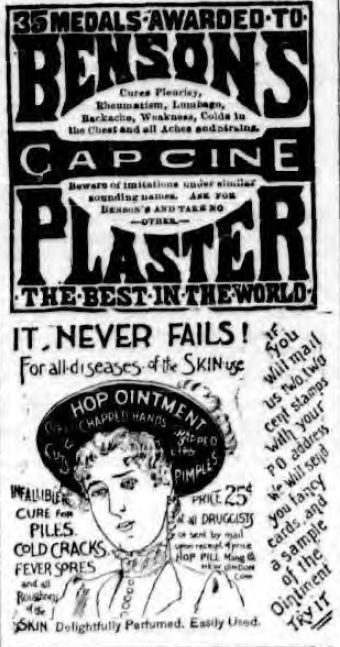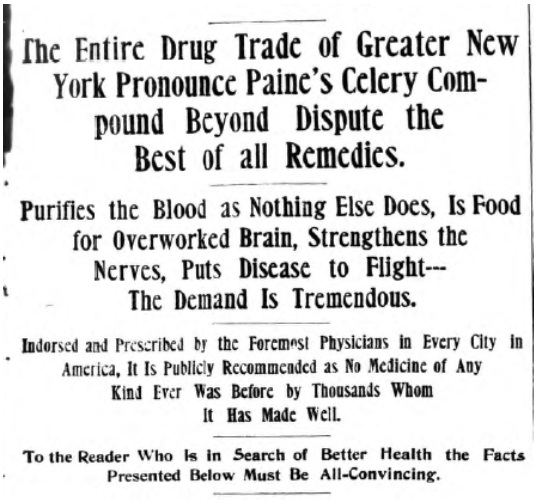One of my hobbies is genealogy research. In looking through old newspapers I can’t help but get a kick out of the advertisements that I encounter. In the mid to late 1800s the papers were filled with write-ups for concoctions that promised cures to all different types of maladies. One that kept recurring over and over was the cure for catarrh. I couldn’t say that I ever had the catarrh, but after a quick search of the term, I discovered that it is an old-fashioned term for inflammation of the mucus membranes. In other words, what we would might call a runny nose.
The golden age of patent medicines
One of my old textbooks states that the era between 1890 and 1906 was known as the “golden age of patent medicines” (Goldberg, Drugs Across the Spectrum, p. 73). During that time period many proprietary drugs “were sold for every possible problem ranging from colds to asthma to alcoholism to sexually transmitted diseases.” This can be reflected in the copious numbers of ads that filled the newspapers of that day. Unknown to most, many of these over-the-counter drugs contained ingredients such as alcohol, cocaine, and opium. Thus, such remedies were very addicting contrary to many of the claims of the proprietors. The sales of these substances were largely unregulated until the passage of the Pure Food and Drug Act of 1906. The article to the right promotes a plaster made from hops. This kind of gives insight into the origin of the phrase of someone being “plastered.”
Credible testimonies
One characteristic that is common with all of these ads is the positive testimony of others who have tried the substances. A solid testimony from someone who was respected in the community was a sure sale and led to lots of profit for the entrepreneur. However, frequently testimony was given by someone who lived in faraway places like Iowa and California. Too far without a cell phone to track down someone. Especially if searching from their home in New York in the late 1800s. Also many of the names used were amusing. One remedy was promoted by Dr. I. M. Strong. Another hair growth tonic product was tested and used by a Mrs. Weed.
The appeal of less suffering and a better quality of life
The obvious appeal of these potions to many a naïve customer was the promise for a cure and the attraction of better quality of life. In the back of my mind is the fact that no matter what ailment might have been pestering these poor souls in the late 1800s, inevitably each one of them by now has met his or her Almighty Creator, with or without the aid of these cure-alls. Some concoctions perhaps even hastened their demise.
As time goes on, today we continue to look for cures and ways to improve our lives. Fortunately there have been advances in some areas of which I am thankful, particularly when my son came down with Scarlett Fever last year. Without antibiotics, this was a disease that killed many in the past. In the old days, people died of things that today seem very simple. My grandmother’s first husband died of anemia. Also frequently I notice quite a few persons without limbs in the genealogy records. I supposed that this is because an arm or a leg was often cut off when it became infected. We like to think that we have become more sophisticated. But still the cure for the common catarrh, although known by other names today, still evades us.
We still need healing
As aging mortal beings in a world that is imperfect, we continue to need healing. We never give up on the quest for a better quality of life. And even if our bodies fail us, we hope to obtain peace in our souls. In today’s Gospel (Jn 14:27-28) Jesus states:
“Peace I leave with you; my peace I give to you. Not as the world gives do I give it to you. Do not let your hearts be troubled or afraid.”
These are comforting words that heal, if and when I am physically declining. No potion, no concoction, no panacea, no patent medicine — but only the promise of peace — from the Prince of Peace. Even if the material substances of this world should hasten my demise, some things endure.


